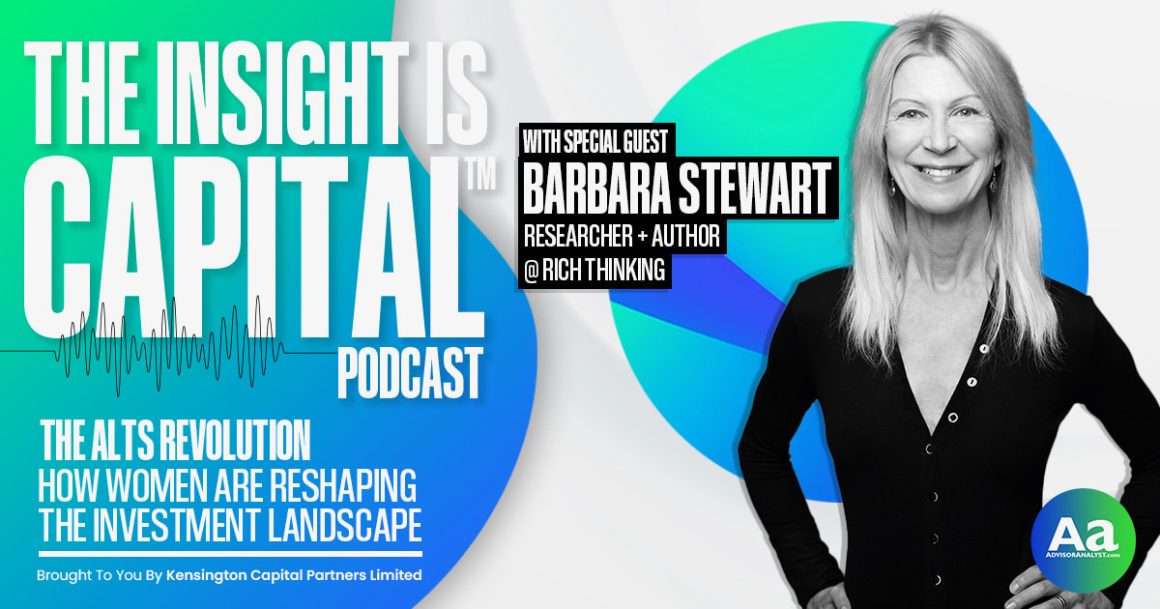Announcement: [00:00:00] This is the Insight is Capital podcast.
Announcement: The views and opinions expressed in this broadcast are those of the individual guests and do not necessarily reflect the official policy or position of advisoranalyst. com or of our guests. This broadcast is meant to be for informational purposes only. Nothing discussed in this broadcast is intended to be considered as advice.
Pierre Daillie:Welcome back to this episode of Insight is Capital. I’m Pierre Daillie, and we’re thrilled to have Barbara Stewart, CFA, renowned global researcher, author, and former portfolio manager joining us. Welcome Barbara is a leading voice in the world of women in finance. And today we’ll dive into her latest white paper, women and alts, a global perspective.
Barbara, welcome to the show. It’s great to have you on. And you may not know this. We’re big fans of your work. We’ve been following your writings at the CFA institutes, Enterprising Investor for Many years. So welcome.
Thank you so much. Thank you. It’s just a delight to be here. I’m looking forward [00:01:00] to our chat today very much.
Pierre Daillie: Likewise. And I’m excited to talk to you about, to talk to you here about your latest work, which can all be found in your deeply researched recent white paper, uh, titled Women and Alts, a Global Perspective, which was commissioned by Kensington Capital Partners.
Exactly. Bravo to Kensington for this commissioned research.
Pierre Daillie: Absolutely. Barbara, before we dig into it, for those who don’t know you, please tell us a little bit about the arc of your career, how you got into the business in the first place and where your life’s work has taken you.
I started out way back in the 80s as a Xerox sales representative. And one day I walked into a trading room, it was a BMO Nesbit trading room way back in the early 90s.
And I just. That’s cool. Fell in love with the energy of the trading room, and it took me 47 interviews with five different banks to get a job, and I finally landed a job in say, institutional sales in FX, put on the desk as a guinea [00:02:00] pig, and somehow figured it out against all odds, because I had no background really in, in understanding interest rates or, FX.
Right. And from there, after five years in the trading room, I moved into private client wealth management and stayed there, and most recently was a partner with Cumberland Private Wealth for about a decade. And I started simultaneously, while working with high net worth entrepreneurs, doing research in the area of women and finance.
And the reason I started doing the research is, it was during the financial crisis, and I thought that You know what, there were a lot of men calling up trying to cash out around the period of the lows in the market. And yet there were all these myths that it were women that were risk averse. And I started thinking a lot about that.
And I thought, you know, the messaging in our industry is a little bit outdated and pretty darn negative towards women and investing. [00:03:00] So I had the opportunity to travel with my husband. He’s with Deloitte in tech, media, and telecom. Presenting around the world. So I thought, why don’t I interview a bunch of super successful women around the world and share some positive messages to try to offset these negative stereotypes, if you will.
I thought I’d write one white paper that was 15 years ago, and one thing led to another, and now that’s what I do full time. My own proprietary rich thinking research and also commissions. Commissioned research such as the one that’s just been commissioned by Kensington most recently.
Pierre Daillie: That’s amazing. But what, what inspired you to write this extensive white paper on women and alternative investments?
Well, yeah, it’s certainly the deepest piece of research I’ve ever done and the one I’ve enjoyed the most, uh, because it was so, so intensive all summer. But, um, The inspiration for it came because my most recent rich thinking paper was called what’s in your investment [00:04:00] portfolio. And for that paper that was released in Stockholm on March 8th, 2024.
So earlier this year, um, I interviewed 50 people, half men, half women around the world, and actually just found out what’s in their current portfolio. I thought that’d be really interesting to find out what do they actually own? Not what they talk about owning, what they actually have in their portfolio.
But the. kind of most important finding that came out of that research was that I found out globally men have double the exposure to alternative assets. And that just struck me, like, really loud and clear, like, what is that? I really wanted to understand what was behind that because, as we all know, um, With alternative assets, specifically private equity, I mean, there’s just been a report between the years 20, 2000 and 2023, uh, private equity returns were 4.
6 percent higher than public equity market returns. So are women missing out on making enough [00:05:00] money for their long lives? Uh, that’s a big, big issue to me. And I, I decided to talk about this with Tom Kennedy, who is the founder of Kensington. And I said, you know, what do you think of this finding? And do you think it’s an opportunity as a way of figuring out how we could attract more ultra high net worth, high net worth female investors?
And Tom found it completely interesting as well. And we were just so curious. He decided, okay, I said, listen, why don’t I interview, you know, a Senior leaders in the finance industry everywhere. Uh, I did 52 interviews this summer with a diverse array of people. I mean, academics, portfolio managers, institutional salespeople, uh, CEOs in the finance world in Thanks in Australia, all over the place.
And I, I had a one hour zoom call with each of them and then wrote a commentary for them, which is all available in the paper. It’s just a [00:06:00] huge amount of content for anyone who’s interested.
Pierre Daillie: That’s amazing. Yeah. So now you, in your white paper, you highlighted this alt gap. Barbara, what are the most significant obstacles that you see preventing women from investing in alternative assets?
Well, it kind of was across the board globally, which I found interesting. So yes, there were cultural nuances along the way, and some places were a little bit worse or better than others. But more or less, there were three key barriers that people came up with and commented on throughout the paper. And the first one is that alts are opaque, if you will.
So generally, they’re less visible. It’s liquid investments, as we know, and women as a tribe really prefer to know absolutely everything about something before they make an investment. And we haven’t done a good job as an industry in providing access to information to all people. So there have been this second thing, which [00:07:00] is lack of a network effect for women.
So A lot of the times that we see people showing deals, it’s not being shown across the board to everyone. You’ve got to be in the right network to have access to those deals, so that’s an issue. And then the third one is, really we’re still, unfortunately, for the most part, part in the game of macho themed marketing.
Uh, you know, I talked to Nordea Bank in Stockholm, which is where I was on International Women’s Day last year. They were saying that their marketing, I mean, they’ve come a long way in alts and there are a lot more female alt managers now. But the ads are still men in suits all the time. And there’s still like sort of two women in a room of 20 if, if anybody’s talking about alternative assets.
So there’s just a lot of work to be done. And I think creating awareness, it was really my number one goal here of, hang on, this can’t be that hard to, to solve the issue. And there’s a lot to [00:08:00] gain if we do solve the issue.
Pierre Daillie: Yeah, I, I, I nodded and laughed when I read the, uh, you know, the remarks, um, like eat what you kill and, you know, that, that sort of man’s world, um, you know, attitude of, of, uh, school boys in a trading room.
And, and, you know, I think, I think that goes back, you know, that goes back to, that reminds me of Michael Lewis’s Liar’s Poker.
Yeah, sure. I mean, it’s not as bad as it used to be, but it’s still not exactly conducive to attracting a female investor to the environment for sure.
Pierre Daillie: You know, looking at, at, at the, like, we’re so tempted here, you know, on our side to, to create mini content.
Modules about, you know, all the various types of alternatives that are out there. Like strategies like long, short and market neutral and merger [00:09:00] arbitrage and, and event driven credit. And, and, you know, those things are getting explained in a much more understandable way. And I think that benefits everybody.
Not just, not just, uh, women who want to know more, but men too. I think, you know, right. I mean, I, I, I. You know, I, for, for as long as I’ve been in the industry, the, the business has never been really that good at explaining, you know, it’s, it’s, it seems to be getting clearer now that, you know, things like private equity and private credit being understood.
And at does you think the
I don’t,
Pierre Daillie: yeah, I mean,
you think Agree. I think it’s, it’s still got a long way to go in terms of this. Yeah. Showed me that. I mean, unlisted securities, there really needs to be a lot bigger effort to tell the stories behind what are these companies that we’re actually investing in?
What do they do? Even rather than just talk a [00:10:00] fund where nobody understands what’s even in the fund and what are they accessing by buying that fund.
Pierre Daillie: One of the things I was most surprised by was. The size of the private equity market versus public markets. I don’t think, I don’t think a lot of people realize the private equity market is.
It’s eight times larger than public equity markets.
Yeah, that also surprised me even not so many years ago. It’s just not a well known thing. And we just have, uh, you know, marketing is really in need here big time. And I think innovation and marketing will probably come from women moving forward for these reasons.
Pierre Daillie: As companies grow. Seek to satisfy that, that need to explain things better to everyone, but especially to women. Yeah, because that’s. It’ll just happen. Yeah. So coming back to, you mentioned you, you had interviewed 52 global finance leaders. Which of their insights surprised you the [00:11:00] most and why?
Hmm. Well, I think the biggest surprise, well, actually one surprise was going into it because of the amount of research I’ve done on women and money over the last 15 years, I, my key finding all along the way was women prefer to invest in causes and concerns that really matter to them.
And I was going into this area. industry leaders project by thinking everybody’s going to talk about ESG and that that’s what’s necessary and that’s of course been a sector that’s been flourishing for the last few years. But one of my big surprises was no, um, ESG has really taken kind of a a second place.
What’s important to women around the world today is investing across all sectors and with the goal and the primary objective of making money. And nobody was afraid to talk about that. It’s a much more, let’s make some money. Let’s have equal access to alternative investments. We’re interested in them.[00:12:00]
We’re interested. Now show us how to get invested in these things and give us all the information that we need to do our due diligence, to make an appropriate investment decision, talk about the risks, the rewards, everything else we need to know, then we’ll invest. We’re as interested in investing as all as men are.
We just want more information to do our homework. And then the other, I found pretty big surprise and maybe not, maybe not It shouldn’t be a surprise due to geopolitics these days, but the defense sector is a very important investment sector to women, and it used to be, as you know, Cath was kind of in along with sin stocks, like shouldn’t be buying this, maybe a bad reputation, uh, like tobacco or alcohol.
But now a lot of these leaders told me that women are very interested in Investing in defense, drone technology, radar technology, um, not just to protect their [00:13:00] families, um, but actually, again, to make money, seeing this as a, as a big opportunity sector in today’s environment.
Pierre Daillie: So that sounds like the industry has been very presumptuous.
Aren’t we good at that?
Pierre Daillie: Yeah. To presume to know what, what women are interested in and then try to deliver it, you know, almost forcefully. Yeah. I mean, one
gentleman I interviewed, he was in the private equity world in the UK. He said, when I asked him if I could interview him, he said, nobody’s, nobody’s, nobody’s Ever talked about this before.
Nobody’s ever said, and he was with a major consulting firm. He said, what do women actually want to invest in? I thought that was fascinating.
Pierre Daillie: That’s amazing. I mean, I think, I think, I think a lot of people in the business would be, would be surprised by that remark, which is, you know, Wow. All this time I’ve just been, you know, talking about, you know, very, very soft and fluffy ideas [00:14:00] and little did I know that, you know, you know, these women are interested in investing in private businesses.
They’re in, they’re interested in private lending. They’re interested. Well, why wouldn’t I do that? You know, and I, I think, I think, you know, and why, you know, I, I remember, you know, in my time as an advisor losing clients. Because I had not spoken to them about something that, that in one case was an advisor down the hall from me who had, and I thought, well, I, I, you know, I didn’t, I didn’t talk to you about that.
And, you know, when we met for the last time, the, you know, my, my response. To her was, I didn’t talk to you about that because I didn’t think it was suitable for you. And we said, well, you know, and then of course, silence, right? Well, I am interested. You know, so this, you know, I had this conversation we’re having is reminding me of, of that.
And now I’m realizing, okay, I was presumptuous about.
But we learn the [00:15:00] most from those experiences, right? Which we’ve all had as advisors. And you really learn the most from your big mistakes like that. Yeah.
Pierre Daillie: Barbara, you offer practical strategies for attracting more women to alternative assets. I think, I think we’ve touched on some of that, um, in terms of the sort of the lead up to that, which, which strategies do you think hold the greatest potential for making a real impact?
If advisors are taking a lot of things for granted or presuming attitudes among their clients who are women, like how do you go about doing that effectively? I mean, first change the mindset, right? But.
I think, first of all, everyone should read the paper if they’re interested, because there’s a whole section on how to attract more women into the alternative asset category.
And it’s not just my opinion, this is the opinions from some pretty senior marketers around the world. So, I mean, there’s top level advice here for how to [00:16:00] attract more clients. Uh, so definitely read the section. But if we were to pick one or two things that, uh, specifically seem to work, I mean, that have been proven marketing strategies, one is taking a very curated approach and getting a small group of high net worth or ultra high net worth women together and discussing things.
Uh, all of these alternative assets in great detail, in conversation, talking about the stories behind the companies that are up for grabs in terms of investments and the opportunities, but really taking the time to go into detail and tell the stories behind it. And the people that are doing that are having great success with these small, maybe 10 to 12 women in a group, but curated, inviting people that are perhaps like minded.
Um, similar levels of wealth, similar types of interests, that kind of thing. Takes time to put that kind of event together, and small is good, [00:17:00] but can be incredibly powerful and lucrative for an advisor if they get that right. Um, the other way, sort of the other extreme, which I’ve personally experienced, um, A very fun, large, splashy event for like 2, 000 women with tons of champagne.
Women love champagne, as it turns out. So, back when I started doing this research, I was invited by NASDAQ in Stockholm to do a ladies night keynote. And we had all of that there. But the big thing wasn’t just a fun, splashy event. It was that, and tons of networking. But they had an objective, which was to get women to buy stocks at the end of it.
So I could say at the end of my presentation, okay, go out and buy a stock, and they’re all hyped up, but yet they had all the vendors and investment firms and online banking. I’m standing by at the stock exchange accounts while these women are walking around drinking champagne. It was [00:18:00] amazing. People were opening accounts left, right and center.
And then I ended up saying, listen, I want to hear what happened when you started investing. Call me, share with me, whatever, and I’ll share some of the, the top success stories. So there was sort of like a follow on with, here’s what you can do, tell, and, and talk about it. Women love to share.
Pierre Daillie: That, that’s an, that’s an amazing story.
That’s such an unorthodox. Uh, Approach. I mean, that sounds more like a conference you would have for advisors than for private investors. So
Barbara Stewart: they all bring their friends and they’re all in the same knock bracket, if you will.
Pierre Daillie: Yeah. I’m not saying it critically. I think that’s, I think that’s incredible.
Like usually, usually when you hear about what you just described, the room is, it’s a room full of advisors who are influencers to their clients, of course. But if you can do the same kind of event, but for private investors, Uh, instead for, I mean, for investors, period, um, [00:19:00] you’re, you’re going to get a very, you know, it’s, it’s something, it seems like, wow, really?
I know. I’ve seen it. We’ve seen it all.
We actually did the, like, copy paste event in all different cities because it was so up to
Pierre Daillie: date. And, and, and then, and then I think the context of being in Stockholm is even also very interesting because you don’t, you know, I don’t think us over here in North America are thinking of Scandinavians or Northern Europeans as the same sort of breed of investment or capitalist.
Uh, you know, thinking investors as, as we tend to be here, but I’ll tell you the women sure are, they’ve been the
front, they’ve been the front runners in this whole thing about women investing and they continue to just be left, right, and center building these social platforms and really ahead. It’s, it’s, it’s been great to be part of that.
Pierre Daillie: And Barbara, I don’t want to do a [00:20:00] disservice to your white paper. You did mention that there’s a lot of detail in. In the implementation strategies, uh, two of which you just shared, but there’s much, much more in that white paper, uh, than what we’re time limited, able to talk about here. Uh, so make sure you read the white paper.
Looking ahead, uh, what future trends do you anticipate in the alternative investments landscape, particularly concerning women’s involvement?
I think, first of all, given this um, really solid piece of research, that some of this research is going to get actually implemented. I think a lot of these strategies will get implemented, and they are being implemented around the world right now.
So I think that will continue. And if this goes the way it does with other asset classes, we’ll see that alt’s gender gap close. Be zero. I think that’s happened with public equities, uh, thanks to the pandemic. Actually, there were so many more women investing. The gap is [00:21:00] now closed. And I think also, as we said earlier, we’re going to see marketing innovation driven more by women products designed by women in the investment industry and, you know, no presentation goes without talking about A.
I. And an interesting example, a woman I spoke with for this research in South Korea mentioned she’d had a huge promotion recently as an ALTS fund manager. And the reason was Um, because of AI, she had never been able to speak English properly, but she was able to do all of her communication now, without the language barrier, thanks to generative AI.
And it made a massive difference, because she had all the knowledge, of course, to get the next big promotion. But now, since she could use Gen AI for the English part of it, she’s running a very large alternative asset management portfolio in South Korea. Amazing. Amazing. I think, so that’s another [00:22:00] example that will level the playing field for women moving forward in the alt space.
Pierre Daillie: I wanted to make a point, which was that, that, you know, we talked about the alt’s gender gap. Um, and it reminded me that, that, you know, a lot of the arguments that are being made by companies today are the gap that exists between retail investors and institutional investors, that institutional investors have much larger proportions of alternative assets in their portfolios.
They’re liquidity or illiquidity of some of those instruments. That when are investors going to realize that they can have more institutional like portfolios that have, that are more resilient, that can withstand more market shocks, that have more uncorrelated assets versus, you know, the core 60, 40 portfolio, when are investors going to become less, less worried about tracking error and things like that, [00:23:00] you know, Versus looking out for themselves and their objectives instead of worrying about what their neighbors are doing.
There’s always the argument that, you know, there’s the counter argument over the same idea which is that, you know, private assets don’t get marked to market the way public assets do. Um, so they’ve got this unfair advantage. Of being, you know, smoother writing assets, right? They’re not, they’re not volatile.
They don’t get marked every day, um, versus, versus public markets. But the counter argument to that perennial argument about alternatives, about private assets, is why not? You know, like why not have participation in private assets where you potentially have more input, you know, you potentially have more insight into what’s going on internally, uh, why not be [00:24:00] involved in those types of assets where, you know, Where if there is a short term correction in the market, you’re not affected in those asset categories, those private categories.
And your portfolio has a smoother ride, which helps you to avoid making those classic behavioral mistakes.
Exactly. And it did come out that number one sector of interest for women was private equity. And particularly if they could have access to health care. Globally, women are most interested in health care and often, um, femtech as an example.
So, you know, it comes back to what you were talking about earlier that men would like better information as well. I think we all would. And so if we can all learn more about these unlisted companies and what the opportunities actually are and the stories behind them, we’ll be way ahead of the game. Both genders, I would say.
Pierre Daillie: I think people would be startled to find out how many private companies there are in [00:25:00] just in the U. S. alone, for example, that have revenues over a hundred million dollars a year.
Not kidding. Yeah.
Pierre Daillie: That, there was something that I was astonished by when I found out about it. I don’t know what the exact number is anymore, but I was astonished by the proportion.
And it was actually, it was the, the statistic that I quoted earlier, I think was eight times that there’s eight times the number of companies in the private equity market. versus the public market, it was eight times the number of companies that have revenues over a hundred million dollars, which so it doesn’t even, it doesn’t even begin to count, you know, the number of companies that have sub 100 million dollars in annual revenues.
Or. Sub 50 or sub 10 million where, where, you know, you’re getting into, uh, even, uh, and even more of, you know, vast marketplace that, that most investors have never had access to, and with all the changes that are happening in the marketplace and the accessibility [00:26:00] improving through, through, you know, all these new vehicles, uh, and even, you know, ETFs and, and private equity, um, markets.
Okay. Um, you know, these opportunities are becoming more widely available. Uh, I mean, you need, you need, I think you need good advising to navigate that, but. But it’s out there, it’s, it’s available, it’s, it’s, you know, you only need to look for it. And that’s, that’s the most amazing thing that I discovered.
There’s, there’s a lot of, you know, fantastic, capable practitioners in the marketplace, uh, who would, you know, love nothing more than to spend the time explaining, you know, how they’re, how the instruments work, how the solutions work, how to get into it. You only need to ask.
Yeah, and I just think I should remind all the advisors who are listening that women, for sure, want to make money the same way that men do.
And they want to understand the risks and rewards the same way that men do. It just might take a bit longer to have the conversation because we [00:27:00] tend to be kind of Perfectionists around wanting to understand it all, but once a woman is interested in an investment opportunity and it’s aligned with her personal interests, she’ll definitely take a calculated risk and make the investment.
There’s no question.
Pierre Daillie: Yeah, that seems to be the biggest revelation of all. If, if indeed it is a revelation, I’m, I’m frankly, I’m, I’m, I’m surprised, but I’m not surprised. It’s one of those paradoxical things.
It should be common sense, but it hasn’t been. So here we’re shining a light on it today.
Pierre Daillie: Barbara, what advice would you give to women who are interested in exploring alternative investments, but feel.
Perhaps hesitant or overwhelmed.
I always give the same advice whether it’s alts or any other investment. Um, it is the just get started. Um, you know, just getting your feet wet. Take a small amount of money, doesn’t have to be a large amount of money, and just buy something. So, Whatever it is, do a little bit of your own research, [00:28:00] buy anything, and let me know how it goes.
Uh, I am always open to people talking with me by email, by chat, by whatever. Um, I love it when women just get started investing. And you just, the best way to overcome feeling overwhelmed or anything is to do it. It’s, it’s kind of like, Yeah. Public speaking or anything else, the more you do it, the less overwhelming it becomes.
And there’s kind of no other way around it. If you don’t do it, it’s not going to happen. So just get started.
Pierre Daillie: Yeah. Buy some alts. Barbara, is there anything, is there anything that, um, we didn’t talk about? So far that you didn’t, that, that you’d like, is there anything else that you’d like to share as a, as a parting thought?
I would just like to thank Kensington for sponsoring this research. This research is incredibly important and, um, it’s been wonderful to see the response to it. From around the world and all of these other leaders, I have thanked in the report, but if [00:29:00] anybody’s listening for their input, I mean, I asked 52 very senior people for their time to contribute, and not one of them said no, and not one of them got like their compliance department said no, so I was thrilled.
I thought compliance would get involved and I wouldn’t be able to produce this level of research, but it’s been incredible. to have all of that input from these types of people around the world. So thanks to anyone that was part of this. And to you as well for producing this podcast around it.
Pierre Daillie: Well, I’m, we’re, we’re honored to take part in this, to do this with you.
And we’re, we’re admirers of your work. And, um, you know, we, we, we love what you’re doing. We’ve been reading your work for, for many years now. And it’s not, and it, and, and to tell you the truth, it’s not, it’s not just appealing. To women, even though, you know, that, that is some of the, that is a [00:30:00] big part of the intent of what you’re doing is to, is to reach more women with, with your intelligence that you’ve researched, it’s universal, it’s universally appealing.
That’s so great to hear. I’ll just keep up the good work then.
Pierre Daillie: But Barbara, you know, please do. Um, thank you so much for your incredibly valuable time, your work, and your insight. It has been a pleasure to meet you and talk to you.
Thank you so much, Pierre. I really appreciate [00:31:00] it.
Listen on The Move
In this episode of Insight is Capital, Pierre Daillie welcomes Barbara Stewart, CFA, a renowned global researcher, author, and former portfolio manager, to discuss her latest white paper, 'Women and Alts: A Global Perspective.' Commissioned by Kensington Capital Partners, the in-depth 64-page research paper explores the Alts gender gap and the barriers preventing women from investing in alternative assets. Barbara shares insights from her extensive interviews with 52 global finance leaders, highlighting the need for improved information, network access, and inclusive marketing strategies. She emphasizes the importance of tailored marketing approaches and encourages women to begin investing, stressing the significance of understanding risks and making informed decisions. You can download the entire enlightening research report (and guide), full of detailed and universally practical tips and insights into the blossoming market for alternative investments, below.
00:00 Introduction
00:19 Welcoming Barbara Stewart
01:22 Barbara's Career Journey
03:37 Inspiration Behind the White Paper
06:05 Key Findings and Barriers
15:08 Strategies to Attract Women (and Men) to Alts
20:17 Future Trends and AI Impact
27:31 Advice for Women Interested in Alts
28:33 Conclusion and Acknowledgements
Copyright © AdvisorAnalyst, Barbara Stewart, Kensington Capital Partners















